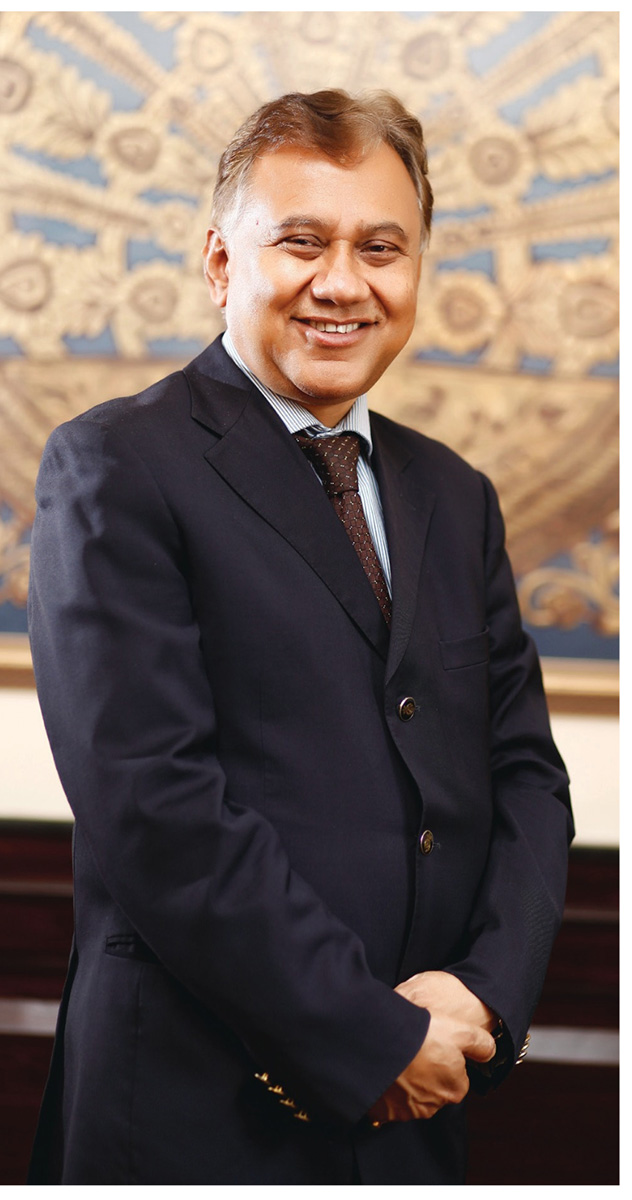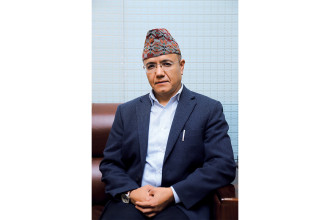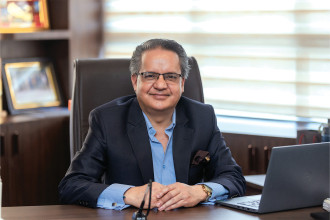
Krishna Gyawali is a former Secretary of the Ministry of Industry, Ministry of Environment and former Joint Secretary of the Ministry of Finance. Currently, he works as Research and Policy Advisor to South Asia Institute of Advanced Studies. He has also served with BBC Radio Service for a year. A highly articulate and respected name in the governance sector, Gyawali talked to B360 on leadership and related issues. Excerpts:
How would you define leadership?
Leadership is a combination of attitude, competence and image. A positive mindset towards acknowledging, diagnosing and solving the problem and breaking the status quo and bringing in change is a must to become a leader.
What is the biggest challenge you faced while working in different capacities of government service?
The biggest challenge was that the people I worked with would not possess the twin attributes of competence and motivation. There are people who know their areas of work at their best, but they would hardly deliver while at work. They would always complain about the lack of ‘motivating environment’ within the system. They would always carry grudges such as “there is no incentive to good performance; good performers are not recognised and rewarded; and what difference would it make if I perform well?”
What motivates you in your work?
The most important motivator for me is recognition and reward. The reward need not always be monetary. What happens is that lack of fiscal incentives may become demotivators to work, but its presence may not always be the motivator either. The recognition and appreciation of work in public gives you utmost satisfaction. Likewise, a team of like-minded companions, conducive work environment and responsive subordinates are other motivators.
What are the keys to success in leadership?
Leadership can never be authoritarian and dictatorial. To accept a leader to be authoritarian is a wrong and outdated, even irreverent, notion of leadership. Leadership in today’s world should be consultative, collaborative and dialogical. There is no such thing like command and control that leaves a lasting imprint of leadership in modern days; it is rather coordination, communication and collaboration that make you a good leader. I often say leadership is about “together-ship”, instead of commanding a “follower-ship”. I rather endorse the “round-table relationship” where leaders and followers interact with each other without any inhibitions. A leader should be driven more by wisdom than by knowledge, and by willingness to learn than by reluctance to admit mistakes.
Is leadership earned?
Yes, it is. The trait theory of leadership states that leaders are born. But I do not believe in this notion. Inheritance could ease the grooming process, but will not decide the ultimate fate. People reject incapable leaders even if they are heirs to their parents and inherit the family legacy. Leadership is earned and learned through commitment, determination, honesty and competence in different walks of lives.
What are the key components that drive leadership?
Leadership is not a miraculous and charismatic concept in modern times. Anybody can become a leader provided the person embodies five attributes: a) commonsense—supported by some amount of knowledge and wisdom; b) honesty and integrity, commanding deep respect of the people; c) positive thinking toward solving problems; d) ability to mobilise people in a team; and e) firmness with politeness in mannerism and behaviour.
Generally, we blame political instability for failure in every sector. Your thoughts on our political leadership…
The ‘blame game’ should stop. Of course, politicians have let us down on many occasions, but it is us who have chosen them, and encouraged and endorsed them, knowingly or unknowingly. As the saying goes, “you get the leaders you deserve”. They also say, “A politician cannot be any better than the people s/he represents”. We have a tendency here to blame politicians indiscriminately. I am not saying they are doing their jobs up to the mark, but they are learning and unlearning from their experiences. In fact, young generation should enter politics and gradually create its own space and impact. Recently, this has begun to be noticed and I strongly support and encourage this tendency.
Do you think politics in Nepal lacks will or lacks leadership?
We lack none. We have will as well as leadership. The problem is that there has been a mismatch in the system. Those who are competent and honest, they have not been given due responsibility by the system, barring a few exceptions. There are many others who deserve the honor and authority both in government and political party mechanisms. But they have been sidelined. We need to raise voices and put pressure on picking right choices for right jobs. We need to say goodbye, at least publicly, to the septuagenarians and octogenarians.
How do you assess the economic status of the country?
The current economic status of the country is not that bad, as shown by the data. This year, in fiscal 2016/17, the growth rate is estimated to reach around 7 percent (6.94% to be more particular), which is the highest in the last 24 years since fiscal 1993/94 when we had the record 8.4%. The macroeconomic indicators are good as told by the international organisations such as IMF, World Bank and ADB in their reports. But the core base of the economy is not good, meaning that there is no credible assurance of continuing this growth rate for some years on sustained basis.
Central Bureau of Statistics has projected 6.9 percent economic growth rate for the current fiscal year. What should the government focus on to achieve the target and retain it?
The growth rate is encouraging and worth celebrating. But the challenge is to sustain it. To meet this challenge, more investment needs to be made in public infrastructure both by the government and the private sector, a robust regulatory system and institutional mechanism needs to be created, corruption should be brought to zero-tolerance level, impunity should be ended and the public servants should be held accountable to the rule of law. A new economic policy that is liberal, progressive and judicious should be launched putting a core team of a new breed of bureaucrats and political technocrats at the helm for its execution.
What is your opinion on the culture of recommendation to get work done?
As long as it does not involve personal connections of relations and relatives, favouritism and nepotism, it is not bad. A candidate needs to prove his/her academic, personal and professional credential, and a referee or a recommender is required to testify that to the satisfaction of the employer. But this personal reference is very bad. This kills talents and jeopardises meritocracy.
Who are the people in your life who have inspired you to achieve success?
There are many. As a child, it was my father. He taught me not to waste time on unproductive purposes, be firm, humble and simple in character, and aim for the highest goal of enlightenment in life. When I joined college, it was BP Koirala, a true statesman and towering intellectual politician of Nepal. Likewise, Prof. Bidur Paudel was my Sanskrit grammar teacher at Valmeeki Campus, who later became a Member of Parliament. He has left an indelible impression on me—by teaching me the values of self-respect, honesty, hard work, and “simple living and high thinking”. During my decades long civil service career, many public servants and leaders have influenced me at various stages and molded my thinking and behaviour. I am deeply indebted to them.
Any books on leadership you wish to recommend?
Leadership cannot be learned through the books. It is learned with your own attitude and action to bring change in the society you live in. Of course, there are books that teach you theories, paradigms and models. I was fascinated by one such book Leadership on the Line: Staying Alive through the Dangers of Leading by Marty Linsky and Ronal Heifetz.





-(1)-1752214965.jpg)